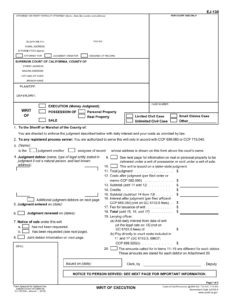Forms Committee Report – March, 2017
March 20, 2017
CALSPro Board Meeting 3/25/17
There are 2 form proposals I am monitoring and commenting on which will have an impact on process servers in 2018.
- Request for Entry of Default (revise form CIV-100; adopt form CIV-105)
There are proposals to revise the existing Request for Entry of Default form, and to adopt another specifically for default judgments against defendants whose debt was purchased and assigned to a third party.
Requirements of the Fair Debt Buying Practices Act
The Fair Debt Buying Practices Act, which took effect January 1, 2014, imposes a number of requirements on debt buyers pursuing collection efforts, including that no default judgment may be entered against a debtor defendant unless the debt buyer plaintiff submits certain documents, authenticated through a sworn declaration, to establish specified facts (Civ. Code § 1788.60(a), (b)). If the debt buyer has not complied with the Act’s requirements, the court cannot enter a default judgment for the debt buyer (Civ. Code § 1788.60(c)).
- Writ of Execution (revise form EJ-130)
The writ of execution form changes were initiated last year, and were not revised due to a number of comments received.
The form is going through a significant revision. The identifier as to whether the case is a limited or unlimited case has been refined, eliminating the apparent confusion and rejection for a failure to distinguish small claims case and family law case as limited or unlimited cases. The designation is critical for the sheriff to determine timeliness for the time to appeal (30 vs. 60 days) when a claim of exemption is filed.
The item numbers are being rearranged, a belief that making the entries fall more logically while calculating debits, accrued interest, and how credits are applied.
To accommodate notice to the Judgment debtor, a third page is being added.
The committee is also revising and cross-referencing the Memorandum of Costs After Judgment, Acknowledgment of Credit, and Declaration of Accrued Interest (form MC-012) to more fully integrate the information on this form to prepare the writ form more accurately.
The committee is also developing a proposing a new form, Information Sheet for Calculating Interest and Amount Owed on a Judgment (new form MC-013-INFO) to explain how credit payments received from the debtor towards interest, costs, and judgment principal, and refers the creditor to form MC-012.
The Judicial Council Invitation to Comment Memos are linked below and explain these changes in more detail, and displays the proposed changes to the existing forms, and the proposed new forms. You may also register comments.
Civil Practice and Procedure: Request for Entry of Default
Civil Practice and Procedure: Writ of Execution
Tony Klein

